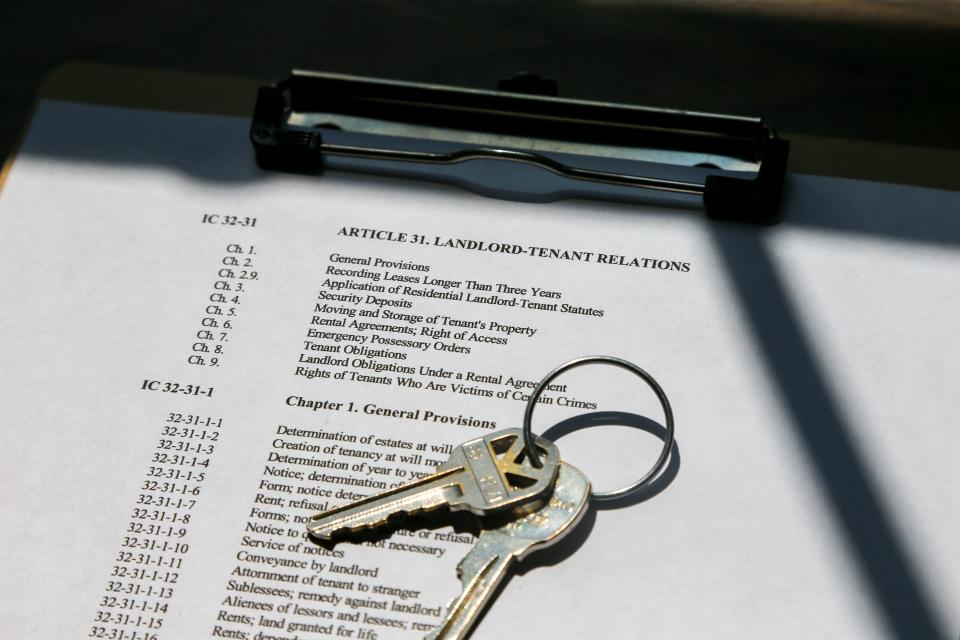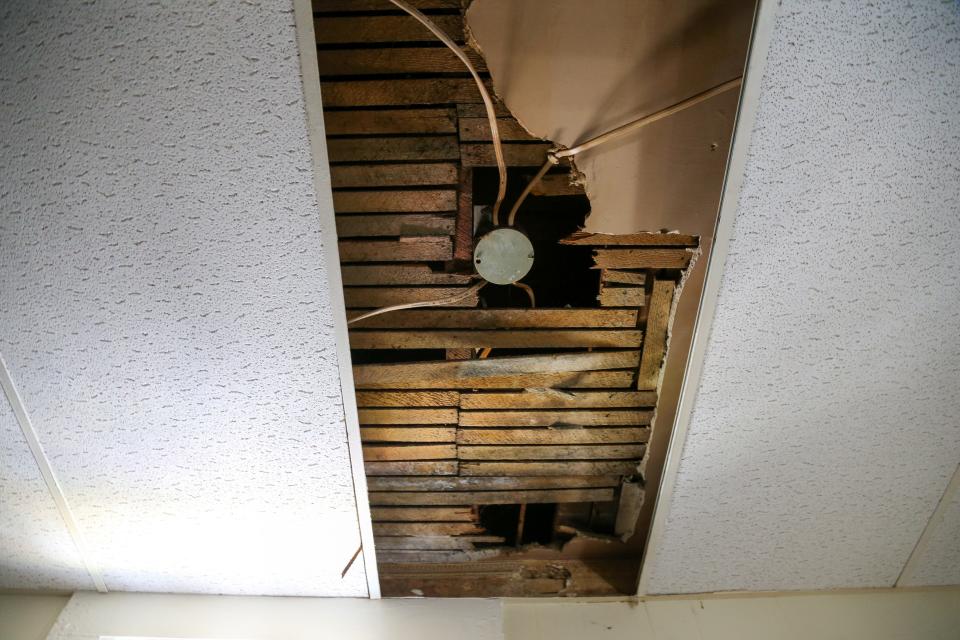As Hoosier renters, what rights do you have? Different than your landlord's rights
LAFAYETTE, Ind. — A Lafayette couple learned the hard way that their rights as renters aren't as lock solid as they had hoped.
Faced with what they described as uninhabitable conditions, the tenants shared with the Journal & Courier their experiences renting a house from a Purdue University adjunct professor.
During the six months that the tenants lived in the rental home, the professor, the tenants alleged, did not comply with their maintenance request and did not hold up half of his contractual duties.
This left the tenants pondering what rights they have within the state of Indiana.

Different rights for Hoosier landlords and tenants
The Journal & Courier sat down with the Legal Aid Corporation of Tippecanoe County and Tippecanoe County Superior Court 7 Judge Daniel Moore to obtain the information provided in this guide.
Legal Aid Corporation of Tippecanoe County is a non-profit organization based in Tippecanoe County aimed at providing low-income residents with free legal assistance for certain litigation.
The focus of this guide is for an individual living in Indiana who hopes to learn about their rights as a tenant in the state.
For individuals looking for specific information or aid regarding their county, they can visit indianalegalhelp.org/get-help.
Indiana Legal Help was a program created by the Indiana Bar Foundation in 2018 with the goal of making it easier for all Hoosiers to find legal assistance.
What responsibilities do Indiana landlords and tenants hold to each other?
Landlords
Before examining what rights tenants hold within the state of Indiana, it’s essential to establish what responsibilities both landlords and tenants are expected to meet.
The landlord has a duty to provide a property that meets the warranty of habitability.
The warranty of habitability is a legal doctrine that was established in 1970 after the decision in the landmark case Javins v. First National Realty Corporation. It helped create the standard in which landlords have a duty to maintain a safe and clean residence for tenants to reside in.
According to Indiana code 32-31, the landlord-tenant relations section, it states that a landlord must provide a tenant with a rental property that is considered safe, clean, in a habitable condition and complies with all of the local health and housing codes and ordinances.
The landlord must also ensure that the property provides and maintains a working electrical system, plumbing system that provides both cold and hot water, sanitary systems, heating in the colder periods of the year, an air condition unit in the hotter periods of the year, ventilation in the property, appliances and elevator (if applicable).

If the landlord signed a contract with a tenant, they are prohibited from changing the locks on the property, removing personal property or appliances from the unit, disrupting utilities or essential services and entering the rental unit without providing the tenant with a reasonable notice, during the contractual period of the lease.
However, this does not apply if the landlord was authorized by a court order to do so or in the case of an emergency.
Tenants
When a tenant signs a lease with a landlord, they are obligated by the law to maintain a level of cleanliness within the unit, which would be defined by local health and housing codes and ordinances.
The tenant must not damage or deface the property they are renting beyond a regular notion of wear and tear.
Although the concept of “wear and tear” was not defined within the Indiana code, the term is defined as “the loss, injury, or stress to which something is subjected by or in the course of use” in Webster's dictionary.
The tenant must follow the provisions detailed in the rental agreement that they signed with the landlord.
It should be noted that the landlord cannot include unlawful provisions in the lease which would violate Indiana law.

For example, the landlord cannot enforce a provision that would allow the landlord into the property at any time without notice, a provision that states the landlord is not liable for any damage done to a person or property if the landlord is negligent in their responsibility to maintain the property, a provision that states the landlord can raise the rent on a tenant at any time, or a provision that allows a landlord to take a tenant’s personal property if the tenant failed to pay rent.
The most important responsibility that a tenant holds is the obligation to pay the landlord the entire sum amount of rent by the contractual date set, even if the landlord does not uphold their half of the agreement.
Indiana is one of six states that does not allow tenants to withhold rent from their landlord if the landlord is unable to complete maintenance by the end of the contractual month.
This is in large part due to how the state’s courts have interpreted the Landlord Tenant Act of 2002, which established that a tenant’s duty to pay rent and a landlord’s duty to maintain a habitable residence for a tenant are independent of each other.
What rights do tenants in Indiana have?
When it comes to Indiana, the state is considered to have some of the weakest tenant rights in the country.
Unlike in other parts of the country, Indiana does not have a rent escrow system put in place if a landlord fails to live up to half of the agreement.
A rent escrow is a legal process that allows tenants to temporarily make their rental payments through a third party rather than directly to the landlord.
Normally, a tenant would need to provide their landlord with proper notice about the escrow and receive approval from a judge before the renter could start withholding their rent until the landlord complies with the maintenance request.
Instead of that system, Indiana tenants are obligated to pay rent and if they wanted their landlord to conduct maintenance on a property, but they’ve continuously failed to complete it, then the tenant only has two real options for enforcement — contacting the county’s code enforcement or litigation.
Depending on the city or county one resides in, the entity a tenant will need to contact regarding code enforcement may vary.
If the issues relate to the structure of the building, like holes in the floor or roof, fire hazards in or around the structure, decaying beams on the property and things of that nature, then a tenant should report the issue to the city’s building inspector or engineering office.
If the issues relate to aspects of the building that may cause harm to one’s health, like severe cases of black mold or contaminated water, the tenant should report the issue to their county health department.
The issue of mold will vary based on the county, depending on if the county’s health code addresses mold in rentals.
“Mold is a very tricky subject, because in some states, like Texas, they have a lot of renters’ rights and mold rights and very specific litigation law about mold,” said Luisa White, the executive director of the Legal Aid Corporation of Tippecanoe County.
“Indiana does not have that.”
For individuals who may be afraid to report these issues to local officials out of concern of retaliation from their landlords, in 2021, the Indiana General Assembly passed a law that prohibited landlords from retaliating against tenants who have engaged in protected activities, like reporting a voluntary housing inspection request.
Tenants have the right to process an inspection of a property from local entities without the concern of retaliation.
If the local entity determines that the property has issues that need to be fixed, then the landlord must comply with the orders given by the entity within a reasonable amount of time, or else they face fines from the local entity.
The second way a tenant can have their landlord meet the warranty of habitability requirement on a unit would be by filing a lawsuit with the county court.
If the landlord fails to conduct their half of the agreement, whether it's because the landlord is not maintaining the property, not providing a required system highlighted in the lease, or failing to keep the property in habitable condition, then the tenant has the right to sue their landlord.
“There is nothing at law or policy that would prevent a tenant from bringing any breaches they might allege against a landlord to court,” said Judge Daniel Moore of Tippecanoe County Superior Court 7.
According to Indiana law, there is only one way in which a tenant could have their landlord reduce their rent if they believe the property requires maintenance, and that would be with a “repair and deduct” clause in the lease.
If a tenant has informed the landlord of the maintenance request of an essential service and has given them a reasonable amount of time to make the repairs, but the landlord fails to do so, then the tenant may repair the issue themselves, and deduct the cost from their rent.
Tenants are advised to get every significant interaction with the landlord in the form of writing when dealing with the property so the court has a paper trail to follow rather than having to rely on hearsay testimony.
Beyond that, if a tenant fails to provide rent by the contractual due date, according to Indiana law, they have at least 10 days (or sooner if the tenant agreed to a lease specifying an earlier date) to pay the landlord, before the landlord can move forward with the eviction process.
The failure to pay is one of several reasons a landlord may use to begin the eviction process. The others are due to a breach of contract, if the tenant poses an immediate threat to the safety of the landlord, or due to a nonrenewal of the lease.
Security deposits must be returned within 45 days
After the lease of the property has ended, the landlord has 45 days to return a sum of the tenant’s total security deposit back to them.
The tenant must provide the landlord with a forwarding address, so the landlord can provide the tenant with an itemized written notice of the assessed damages to the property.
The landlord may subtract money from the deposit if it pays any unpaid rent, unpaid utilities, and/or cost of damages that go beyond regular wear and tear.
“You can’t necessarily get charged for normal wear and tear. They’ll try and charge you for carpet cleaning and painting, but why if it’s not damaged,” White said.
If the landlord failed to provide the tenant with their deposit after 45 days of moving out of the property, then a tenant may recover all of the security deposit due to the tenant and reasonable attorney's fees.
If a tenant or landlord wants to hold a damage hearing with the court to assess how much of the security deposit is owed to the tenant, it is normally held after the 45 days dictated by law.
In smaller counties where eviction hearings aren’t heard too often, the judge may hold the eviction and damages hearings at the same time.
It’s advised that if a tenant were to attend a damage hearing in hopes of retrieving their security deposit, they ought to provide as much evidence as possible to help illustrate to the judge the number of damages they did to the property.
“A lot of the times, people forget to take photos and pictures of the property from when they first move in, so they have that on record. So, when they move out and take new photos, they can compare the two and justify how much damage was done in the residence,” said Brandon Somerville, a Legal Navigator with the Pro Bono Indiana’s Eviction Judicare Program.
For individuals looking for specific information or aid regarding their county, they can visit indianalegalhelp.org/get-help.
Noe Padilla is a reporter for the Journal & Courier. Email him at Npadilla@jconline.com and follow him on Twitter at 1NoePadilla.
This article originally appeared on Lafayette Journal & Courier: As Hoosier renters, what are your rights? Not the same as a landlord's

